Related Research Articles

Liberia is a country in West Africa founded by free people of color from the United States. The emigration of African Americans, both freeborn and recently emancipated, was funded and organized by the American Colonization Society (ACS). The mortality rate of these settlers was the highest among settlements reported with modern recordkeeping. Of the 4,571 emigrants who arrived in Liberia between 1820 and 1843, only 1,819 survived (39.8%).

Frederick Douglass "Fritz" Pollard was an American professional football player and coach. In 1921, he became the first African-American head coach in the National Football League (NFL). Pollard and Bobby Marshall were the first two African-American players in the NFL in 1920. Football pioneer Walter Camp called Pollard "one of the greatest runners these eyes have ever seen."

The American Colonization Society (ACS), initially the Society for the Colonization of Free People of Color of America, was an American organization founded in 1816 by Robert Finley to encourage and support the repatriation of freeborn people of color and emancipated slaves to the continent of Africa. It was modeled on an earlier British Committee for the Relief of the Black Poor's colonization in Africa, which had sought to resettle London's "black poor". Until the organization's dissolution in 1964, the society was headquartered in Room 516 of the Colorado Building in Washington, D.C.
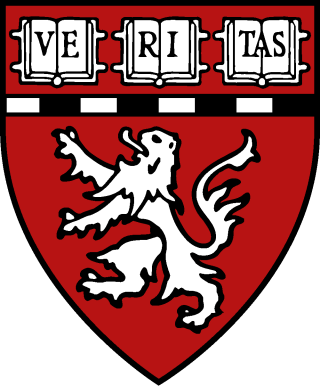
Harvard Medical School (HMS) is the medical school of Harvard University and is located in the Longwood Medical Area in Boston, Massachusetts. Founded in 1782, HMS is one of the oldest medical schools in the United States, and provides patient care, medical education, and research training through its 15 clinical affiliates and research institutes, including Massachusetts General Hospital (MGH), Boston Children's Hospital, Dana–Farber Cancer Institute, Brigham and Women's Hospital, Beth Israel Deaconess Medical Center, Mount Auburn Hospital, McLean Hospital, Cambridge Health Alliance, The Baker Center for Children and Families, Spaulding Rehabilitation Hospital, and others
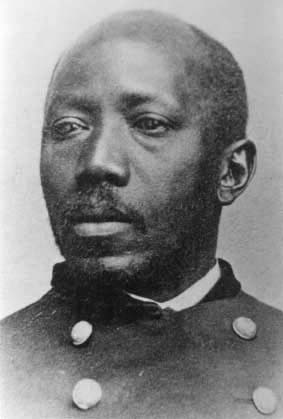
Martin Robison Delany was an American abolitionist, journalist, physician, military officer and writer who was arguably the first proponent of black nationalism. Delany is credited with the Pan-African slogan of "Africa for Africans." Born as a free person of color in Charles Town, Virginia, now West Virginia, and raised in Chambersburg and Pittsburgh, Pennsylvania, Delany trained as a physician's assistant. During the cholera epidemics of 1833 and 1854 in Pittsburgh, Delany treated patients, even though many doctors and residents fled the city out of fear of contamination. In this period, people did not know how the disease was transmitted.

Freedom's Journal was the first African American owned and operated newspaper published in the United States. Founded by Rev. John Wilk and other free Black men in New York City, it was published weekly starting with the March 16, 1827 issue. Freedom's Journal was superseded in 1829 by The Rights of All, published between 1829 and 1830 by Samuel Cornish, the former senior editor of the Journal. The View covered it as part of Black History Month in 2021.
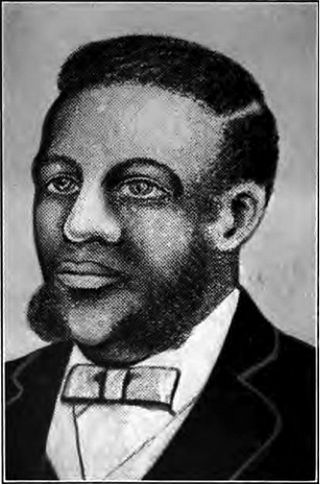
Lott Cary was an African-American Baptist minister and lay physician who was a missionary leader in the founding of the colony of Liberia on the west coast of Africa in the 1820s. He founded the first Baptist church in 1822, now known as Providence Baptist Church of Monrovia. He served as the colony's acting governor from August 1828 to his death in November that year.

Alexander Crummell was an American minister and academic. Ordained as an Episcopal priest in the United States, Crummell went to England in the late 1840s to raise money for his church by lecturing about American slavery. Abolitionists supported his three years of study at Cambridge University, where Crummell developed concepts of pan-Africanism and was the school's first recorded Black student and graduate.

James Skivring Smith was a Liberian politician who served as the sixth president of Liberia from 1871 to 1872. Prior to this, he served as the eighth vice president of Liberia from 1870 to 1871 under President Edward James Roye and as Secretary of State from 1856 to 1860 in the cabinet of President Stephen Allen Benson. He was a member of the True Whig Party.
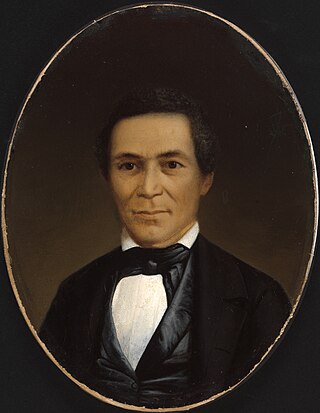
John Brown Russwurm was a Jamaican-born American abolitionist, newspaper publisher, and colonist of Liberia, where he moved from the United States. He was born in Jamaica to an English father and enslaved mother. As a child he traveled to the United States with his father and received a formal education, becoming the first black person to graduate from Hebron Academy and Bowdoin College.

Mississippi-in-Africa was a colony on the Pepper Coast founded in the 1830s by the Mississippi Colonization Society of the United States and settled by American free people of color, many of them former slaves. In the late 1840s, some 300 former slaves from Prospect Hill Plantation and other Isaac Ross properties in Jefferson County, Mississippi, were the largest single group of emigrants to the new colony. Ross had freed the slaves in his will and provided for his plantation to be sold to pay for their transportation and initial costs.

Lewis Woodson was an educator, minister, writer, and abolitionist. He was an early leader in the African Methodist Episcopal Church (AME) in Ohio and Pennsylvania. Woodson started and helped to build other institutions within the free African-American communities in Ohio and western Pennsylvania prior to the American Civil War.
A number of colonization societies which promoted the migration of African Americans to Africa have existed in the United States. Thomas Jefferson was a Founding Father who promoted the racial separation of Native Americans and the colonization of African Americans to places far away from Virginia. Jefferson was the most important early advocate of colonization. The Reverend Samuel Hopkins of Newport appears to have originated the idea of colonization in 1770.

The back-to-Africa movement was a political movement in the 19th and 20th centuries advocating for a return of the descendants of African American slaves to the African continent. The movement originated from a widespread belief among some European Americans in the 18th and 19th century United States that African Americans would want to return to the continent of Africa. In general, the political movement was an overwhelming failure; very few former slaves wanted to move to Africa. The small number of freed slaves who did settle in Africa—some under duress—initially faced brutal conditions, due to diseases to which they no longer had biological resistance. As the failure became known in the United States in the 1820s, it spawned and energized the radical abolitionist movement. In the 20th century, the Jamaican political activist and black nationalist Marcus Garvey, members of the Rastafari movement, and other African Americans supported the concept, but few actually left the United States.

Edward Wilmot Blyden was an Americo-Liberian educator, writer, diplomat, and politician who was primarily active in West Africa. Born in the Danish West Indies, he joined the waves of black immigrants from the Americas who migrated to Liberia. Blyden became a teacher for five years in the British West African colony of Sierra Leone in the early twentieth century. His major writing were on pan-Africanism, which later became influential throughout West Africa, attracting attention in countries such as the United States as well. His ideas went on to influence the likes of Marcus Garvey, George Padmore and Kwame Nkrumah.
Elliott Cresson was an American philanthropist who gave money to a number of causes after a brief career in the mercantile business. He established the Elliott Cresson Medal of the Franklin Institute in 1848, and helped found and manage the Philadelphia School of Design for Women, today's Moore College of Art and Design. Cresson was a member of the Religious Society of Friends (Quakers) and a strong supporter of the Philadelphia branch of the American Colonization Society, a group fighting slavery that relocated former slaves and free African Americans to colonies in Liberia. Cresson was called "the most belligerent Friend the Society ever had."
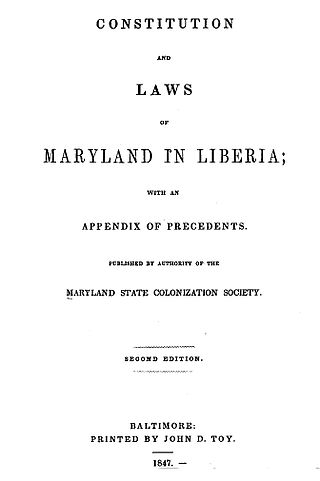
The Maryland State Colonization Society was the Maryland branch of the American Colonization Society, an organization founded in 1816 with the purpose of returning free African Americans to what many Southerners considered greater freedom in Africa. The ACS helped to found the colony of Liberia in 1821–22, as a place for freedmen. The Maryland State Colonization Society was responsible for founding the Republic of Maryland in West Africa, a short lived independent state that in 1857 was annexed by Liberia. The goal of the society was "to be a remedy for slavery", such that "slavery would cease in the state by the full consent of those interested", but this end was never achieved, and it would take the outbreak of the Civil War to bring slavery to an end in Maryland.
Isaac Humphrey Snowden was one of the first three African American students admitted to Harvard Medical School, in 1850, along with Martin Delany and Daniel Laing, Jr. Snowden and Laing were sponsored by the American Colonization Society in doing so and had previously been connected with the Young Men's Literary Society in Boston.
Black nationalism is a nationalist movement which seeks representation for Black people as a distinct national identity, especially in racialized, colonial and postcolonial societies. Its earliest proponents saw it as a way to advocate for democratic representation in culturally plural societies or to establish self-governing independent nation-states for Black people. Modern Black nationalism often aims for the social, political, and economic empowerment of Black communities within white majority societies, either as an alternative to assimilation or as a way to ensure greater representation and equality within predominantly Eurocentric cultures.

The African Civilization Society (ACS) was an American Black nationalist organization founded by Henry Highland Garnet and Martin Delany in New York City to serve African Americans. Founded in 1858 in response to the 1857 Supreme Court decision Dred Scott v. Sandford and a series of national events in the 1850s which negatively impacted African Americans, its mission was to exercise African-American self-determination by establishing a colony of free people of color in Yorubaland. Additionally, the organization intended the colony to Westernize Africa, combat the Atlantic slave trade, and create a cotton and molasses production economy underwritten by free labor to undermine slavery in the United States and the Caribbean. However, the majority of African Americans remained opposed to emigration programs like theirs.
References
- Carroll, John M. (1998), Fritz Pollard: Pioneer in Racial Advancement, University of Illinois Press, ISBN 0-252-06799-1 .
- Cash, Phillip (1993), "Pride, Prejudice, and Politics", in Sollors, Werner; Titcomb, Caldwell; Underwood, Thomas A. (eds.), Blacks at Harvard: A Documentary History of African-American Experience At Harvard and Radcliffe, New York: New York University Press, ISBN 978-0-8147-7973-6 .
- Menand, Louis (2001), The Metaphysical Club: A Story of Ideas in America , New York: Farrar, Straus and Giroux, ISBN 0-374-52849-7 .